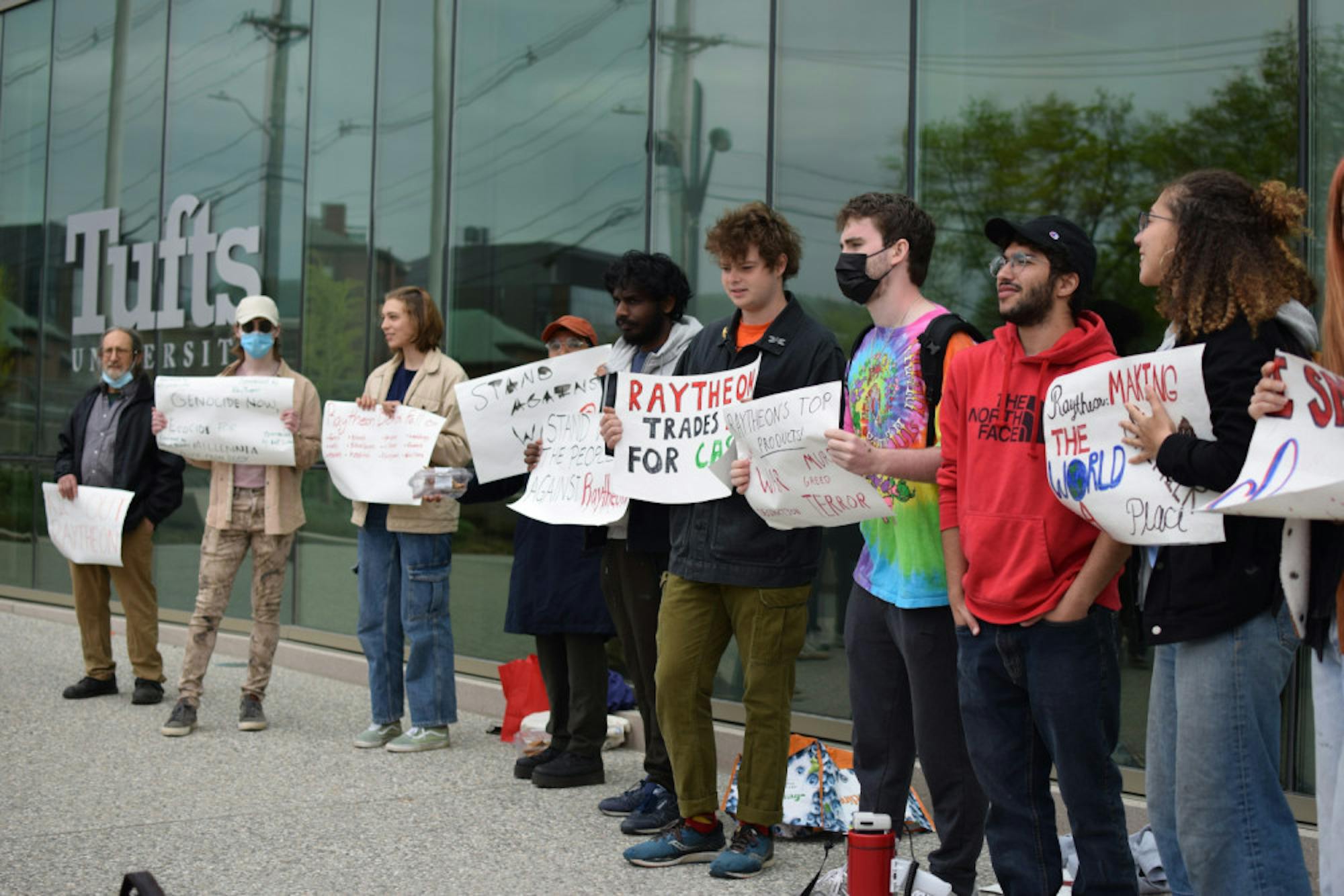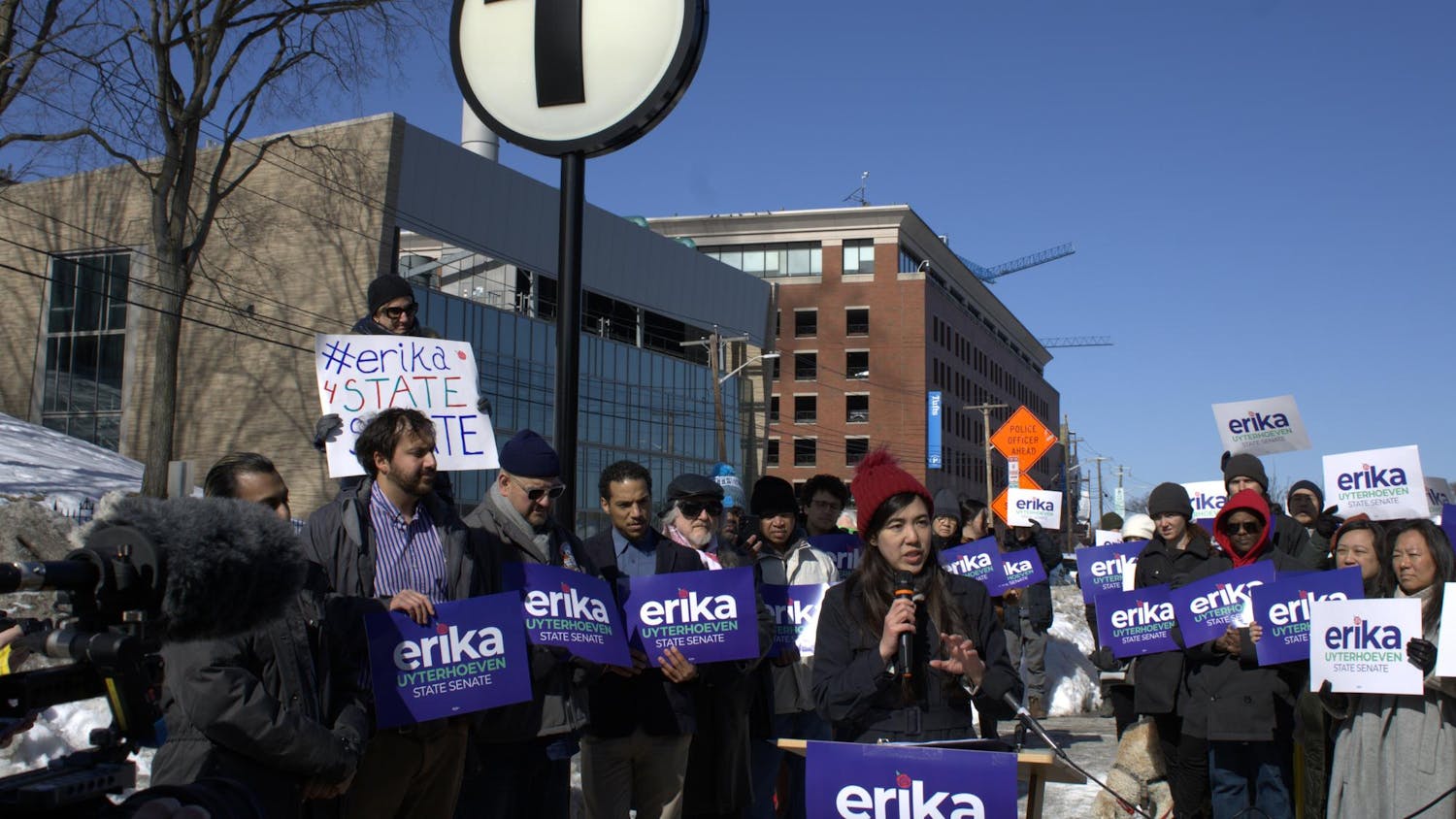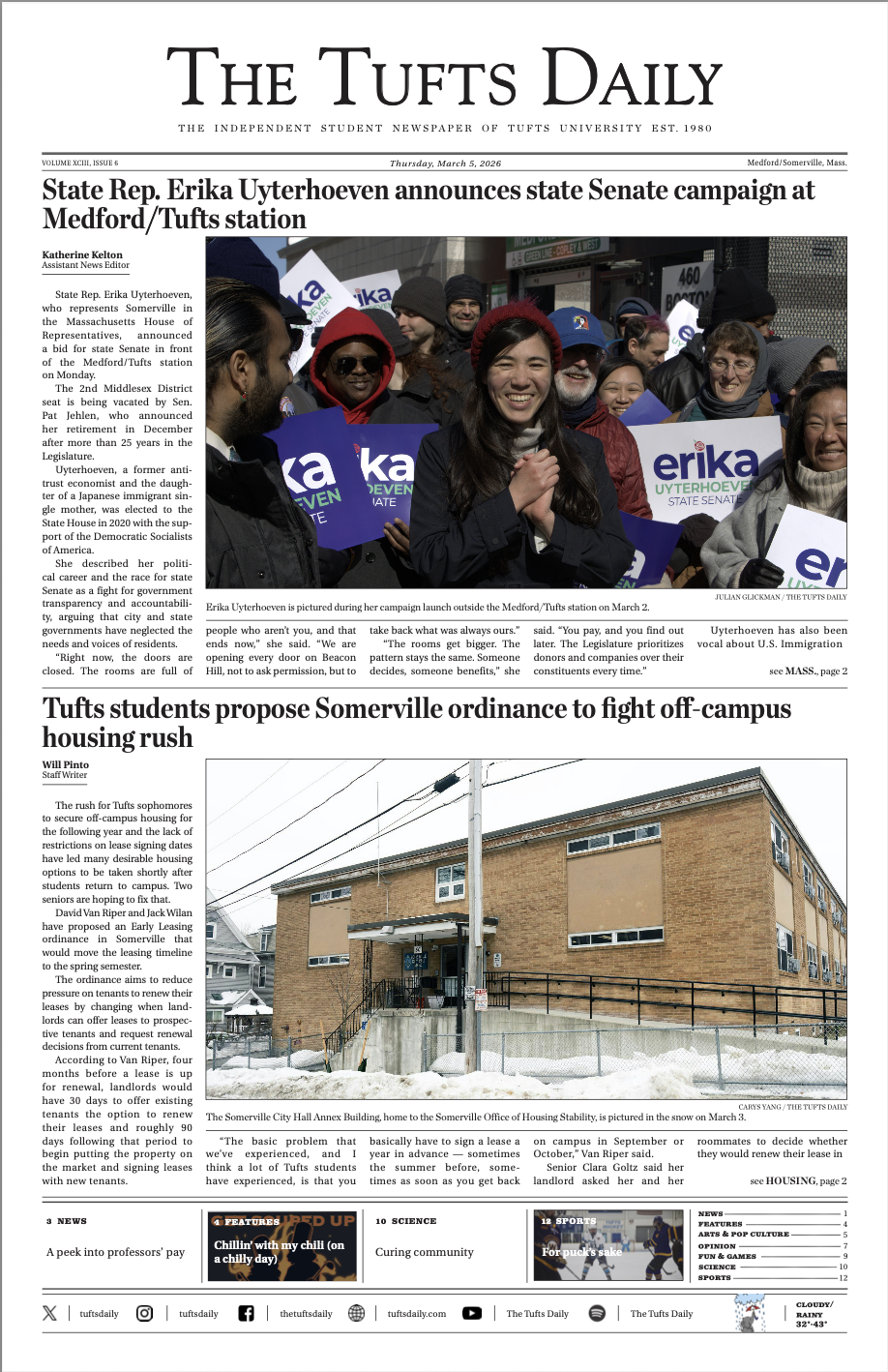Students and community members protested a Raytheon BBN career event hosted by the School of Engineering in Halligan Hall on May 2. The protest was the second demonstration against a defense contractor on Tufts’ campus in less than a week.
Raytheon BBN is the technology research and development subsidiary of Raytheon, a multinational defense conglomerate based in Waltham, Mass. Raytheon manufactures missiles, missile defense systems, naval systems, computer software and other weaponry and technology. It is valued at $145.39 billion, making it the second-largest defense corporation in the world, as of 2021. Its top customer is the U.S. Department of Defense, but it also sells to foreign militaries. BBN, the subsidiary, develops shooter detection systems and sensors.
Monday’s event featured two Raytheon BBN employees, Scott Ritter (EG’90) and Arda Cam, and was geared towards undergraduate and graduate students in the School of Engineering seeking jobs and internships. Ritter and Cam each gave informal presentations on their career paths and then took questions from the audience of over 25 students.
Chants of “Tufts and Raytheon sitting in a tree, sharing all their blood money!” were audible from the room where the event was taking place. Just outside the building, protesters distributed flyers calling attention to a Raytheon-manufactured bomb used in an attack that killed 91 Yemenis in January and to the missiles and surveillance aircraft the company has sold the Israeli government and U.S. Customs and Border Patrol, respectively.
Raytheon BBN, Ritter and Cam did not respond to the Daily’s request for comment.
Raytheon BBN career event reveals divide among Tufts students
During Ritter’s presentation, a graduate student named Nick Rabb raised his hand to ask whether Ritter had qualms about working for a military company. Ritter replied frankly, acknowledging that “Raytheon is a missile company,” but “BBN is a sensor company” whose research and development focuses on defensive systems. Ritter said that although he doesn’t always have a choice about how the technology he works on gets used, his work is on defensive projects.
As Rabb, who is a third-year Ph.D. candidate in the School of Engineering studying computer science and cognitive science, continued to ask critical questions about Raytheon, the speakers and the audience became increasingly impatient with him.
“We can think for ourselves,” an event attendee said to Rabb. Others shared that attendee’s frustration — “Some of us want to get jobs,” one said.
The overwhelming sentiment among the engineering students in attendance was irritation. Someone eventually called security on Rabb, but the two Tufts police officers who responded to the call promptly departed, telling the Daily that neither Rabb nor the protesters outside were in violation of Tufts’ Student Code of Conduct. Rabb eventually left the room and the event resumed.
“[Rabb] was being extremely disrespectful,” one engineering student, who spoke to the Daily on the condition of anonymity, said.
Another engineering student who attended the event said that Rabb’s interjections jeopardized the professional development of students who had come to the event in earnest.
“He almost forced [the speakers] out, and that just ruins our opportunities,” the student said. “This kind of job, it’s very competitive to get, … and it’s these kinds of events that start that journey of getting contacts, of getting internships, getting experience.”
The student, who stayed after the event to network with the organizers, said they don’t mind that Raytheon is a defense company.
“I don’t generally look at if [the] company is in defense or not, I look at if they [offer] good pay, good salary, benefits,” they said. “I guess [it is true] that defense companies do pay more but at the same time … a lot of these companies have funded [other technologies]… which have improved the world.”
The anonymous students also shared that a School of Engineering professor had offered a 100% quiz grade and free pizza to students who attended the Raytheon BBN event.
Rabb was disappointed that the other students at the event seemed uninterested in the answers to his questions and blamed the university for fostering what he characterized as an apathetic culture.
“It became evident to me as I was in there that the culture of a lot of computing and engineering students here is that they don’t really care,” Rabb said. “I think it’s really shameful that a supposedly prestigious university with tons of computing students and tons of engineering students would never have anything in their curricula or anything in their institutional culture that would push people away from — or even introduce people to — the idea that their work may be … used for horrible things. It’s like they don’t even know, and they’re coming from a culture where their privilege shields them from it.”
Students, community members protest Raytheon
At least 15 protesters gathered outside the Joyce Cummings Center and then moved to the front of Halligan Hall. They took turns chanting into a bullhorn and displayed posters calling attention to Raytheon’s arms sales.
Maya Morris, one of the students who organized the protest, was unsurprised that Raytheon BBN representatives visited Tufts’ campus just a week after she and other protesters shut down a recruiting event for defense contractor General Dynamics. Morris, a senior, said that when the university sponsors career events with defense contractors, it feeds the military-industrial complex.
“It’s not that the university doesn’t understand that these arms manufacturing companies are building bombs, tanks, weapons, et cetera,” she said. “It’s that they promote it as being the case that these different arms corporations are working to defend our country, as if our country is on the innocent end of things … and defending democracy in the face of terror, which is not actually the case. Our country … along with these corporations, [is] solely working in their own interests when they instigate wars. … These arms corporations are standing to make profits off of these wars so they continue to perpetuate them.”
Morris stressed that the protest was against Raytheon, not against the students who attended the event.
“The engineering students aren’t the culprits in this situation. They are being sold on a lie about what these corporations are really about,” she said. “They shouldn’t feel like we are criminalizing them because what we’re doing is we’re trying to criminalize and bring to light exactly what Raytheon is about, … not saying that engineering students are evil for attempting to get jobs.”
Rabb pointed out that Tufts and Raytheon have a shared history. Two of the company’s three founders, Laurence K. Marshall and Vannevar Bush, were Tufts graduates. Former President of Raytheon Charles Francis Adams served on the Tufts Board of Trustees from 1970–80 and on The Fletcher School Board of Visitors from 1971–91. Adams’ stints on these boards overlapped with his terms as chairman and director of the Raytheon Board of Trustees, positions he held between the years of 1960 and 1997.
“There were absolutely institutional connections. And there’s clearly still connections,” Rabb said of Raytheon and Tufts.
Monday’s demonstration was not the first time a Raytheon visit to Tufts has been met with student and community protest. In 2019, students, faculty and community members protested a Raytheon company booth at the Tufts Spring Career Fair, leveling many of the same criticisms at the company and the university.
Engineering faculty, administration respond to protesters
Chorng Hwa Chang, associate professor of electrical and computer engineering, organized the event and said it was a valuable professional development opportunity for students.
“BBN has come to Tufts to show their projects and discuss career opportunities for many years,” Chang wrote in an email to the Daily. “They benefit our students and our students love it. Whether they go to work for BBN or not, they benefit from hearing about the perspectives of a section of the Computer and Electrical Engineering and Computer Science industry.”
“While I admire the protesters’ commitment to their beliefs, I am disappointed that they chose to disrupt the event,” Chang wrote.
Kyongbum Lee, dean ad interim of the School of Engineering, discussed the back-to-back protests in a written statement to the Daily.
“We encourage students to voice their opinions on any topic about which they are passionate, but to do so in a safe, respectful, and inclusive way,” Lee wrote. “We recognize that demonstrations can educate and enlighten the community about important issues, but they must be conducted with respect for the freedom of other community members to inquire and express themselves fully and in a way that preserves a climate that is conducive to learning and growth.”
“Disrupting and obstructing University events violates the student code of conduct policy,” Lee added.
Dissenting student alleges intimidation by TUPD officer
During the protest, the Tufts University Police Department dispatched Lieutenant Moses Curry in response to a call for service.
Rabb told the Daily that he spoke to Curry outside of Halligan Hall, and that Curry told him he and the protesters had not committed any conduct violations. However, Rabb said that as the conversation continued, Curry’s statements became increasingly threatening.
“He was telling me that the administration was really not happy about what was going on,” Rabb said. “I remember really specifically, he said, like, ‘I’m just here to look out for you guys, it would be a shame if something happened to all the $70,000 of tuition you all pay a year.’ And that was pretty shocking to me. That seemed like a stereotypical threat.”
Rabb continued pressing Curry on whether the university administration wanted to take disciplinary action against any of the protesters.
Rabb added, “I asked him directly after that … ‘So are you saying the administration wants to kick people out because of this?’ And he was like, oh, no, no.”
Nevertheless, Rabb said he left the interaction feeling shocked and confused.
In a written statement to the Daily, Executive Director of Public Safety Yolanda Smith said that Curry tried to engage with Rabb.
“Lt. Curry does not handle discipline for the university; therefore, he would not suggest the outcome of disciplinary action,” Smith wrote. “Lt. Curry made several attempts to engage in a conversation with the student, encouraging the student to follow policy and procedure as it pertains to student protests in an effort to mitigate any issues. Lt. Curry even offered to meet with the student in plain clothes to have an open conversation to build rapport and establish trust with the student. The student was not amenable to a meeting but indicated that they appreciated Lt. Curry’s efforts.”
Smith further elucidated TUPD’s policies for responding to protests such as this one.
“The Tufts University Police Department for many years, and with regular reinforcement, has had policies and training in place that emphasize that everyone must be treated with dignity and respect,” Smith wrote. “When we respond to demonstrations, we try to engage with the leaders or organizers in an effort to determine needs and expectations … we comport ourselves professionally and in accordance with the University policy.”
In a written statement to the Daily, Associate Dean of Student Affairs Kevin Kraft said he was unable to disclose whether any of the student protestors violated university policy.
“As an educational community, Tufts also has a responsibility to ensure that our students, faculty, and staff can carry out their academic and professional work without undue interruption, disruption, or obstruction,” Kraft wrote. “As a general matter, Tufts’ policy on Gatherings, Protests, and Demonstrations allows for robust protest in a manner that does not disrupt others in an undue manner, create unsafe situations, or interfere with the fundamental purposes of an institution of higher education.”
The Daily was unable to identify any violations of the Student Code of Conduct, including the regulations listed under the Disorderly Conduct, Disruption or Obstruction of Community Activity and Gatherings, Protests, and Demonstrations sections.






